You are here
William's 2012 Olympic Wrap-Up
I didn’t win gold and I didn’t walk on the moon. But I am very satisfied with what I achieved in London and over the 18 months that preceded the Games. Leaving a well-paying and secure job to be poor, spend all my savings and chase a dream of doing well at the London Olympics was probably the hardest thing I’ve ever had to do.
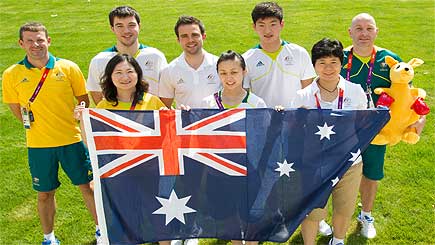
It’s difficult to sum up 18 months of total focus on the 2012 Olympics but I’ll try my best. I felt deeply unhappy with having finished 4th in two events at the 2010 Commonwealth Games. I went back to my desk at work and spent time staring at the wall – would I have won those medals if I had been able to train and compete more often?
A few months later I resigned from my full-time job and began planning my assault on the 2012 Olympics. It was 18 months away and I knew I would need every second if I was going to make an impact at the Games. I spent several weeks making arrangements to spend most of the year before the Olympics based in Europe. I found myself a club in Austria, to cover some of the expenses of the trip, and was fortunate enough to be accepted into the Werner Schlager Academy in Vienna on good terms.
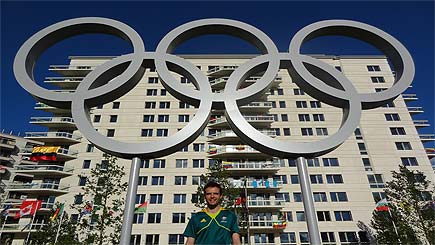
I went through some great times and some very tough times during the 9 months in spent in Europe. The toughest was about a month out from the Olympic qualification. My form nosedived completely and I began losing to players a long way below me. I had two poor Pro Tour events and a weekend of league from hell. The stress and anxiety of what was happening grew stronger and I was on a downwards spiral. What got me through was some timely assistance from a very helpful sports psychologist and the realisation that the worst thing that could happen was that I wouldn’t qualify for the Olympics. I managed to pull myself out of the hole and played some of my best table tennis of the season at the two all-important Olympic qualification events in Sydney.
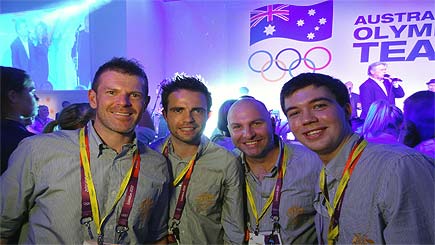
The time I spent in Austria was extremely beneficial. I was able to work with two of the best coaches in the world each day, Richard Prause and Dirk Wagner, and practice with some great players. I think many players have a romantic notion about how fantastic it would be to be a professional player. In many ways it is and in many ways it isn’t. Every day is a hard slog and there were so many times I had to drag myself out of bed to face the afternoon session when all my body wanted was rest. The league competition is the best way to toughen you up mentally and teach you to make fast tactical decisions about what will win you the match. I worked a great deal on my footwork and forehand topspin especially and, together with the coaches, was able to make huge leaps forwards. I am hoping I will be able to maintain and even improve on these aspects with the knowledge I picked up.
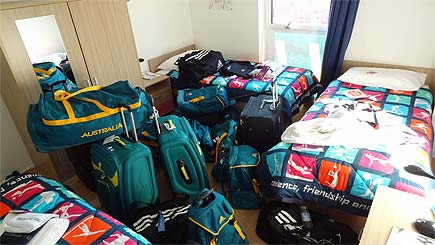
Competing at the Olympics is different – I think every player views it as a special event and will do whatever they can to gain the right to compete there. Seeing players celebrate when they just manage to qualify to compete at the Games shows what it means to them on a personal level. It’s a great occasion to be part of the largest sporting event in the World and to represent your country there. The focus on the Olympics adds a new level of pressure which is not easy to handle even for top players. I feel I handle that extra pressure well and use it to inspire me rather than hold me back. In fact almost all of my best results and performances have come at either the Olympic Games or Commonwealth Games.
Having funded almost all of the 8 months stay in Austria out of my own savings, I was low on funds and needed help to get back to Europe to finish off my final preparations. Fortunately my employer Slater and Gordon helped me out as well as a lovely lady from Sydney, who had heard a radio interview I had done on the ABC and tracked me down in order to sponsor me. The help they provided proved completely invaluable.
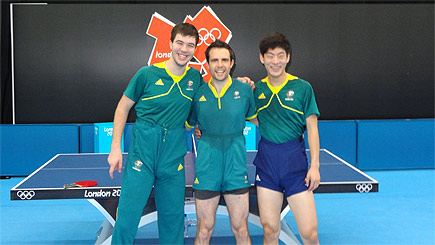
I played a warm-up tournament in Germany about 2 weeks before the Olympics. I played three matches against choppers: two against Evgueni Chtchetinine (WR73) and one against Adam Pattantyus (WR80). I lost all three but played better and better in each of the matches. I drew Pattantyus in the first round in London and without that practice and experience against those choppers, I would almost certainly have lost.
I was feeling pretty nervous before my first match in London. I could see that Pattantyus was also looking nervous and seemed to be stressed by the strict procedures before the match. You must report to a holding area 30 minutes prior to the match where they check your advertisements (only one small logo allowed), shirts, names and rackets. You aren’t allowed to leave once you are there. I started the first set a little shakily. He led 9-6 but I fought back and won 13-11. I eventually won 4-1 after surviving a spirited comeback in the 4th and 5th sets. It was an electrifying feeling to have beaten a much higher ranked player, who I had lost to 3 times in the past 6 months, when it mattered the most at the Olympics. I thought it was a terrible draw when I saw I would play him yet again but spent a couple of days convincing myself I could win and studying videos of his tactics with team-mate Robert Frank and coach Jens Lang.
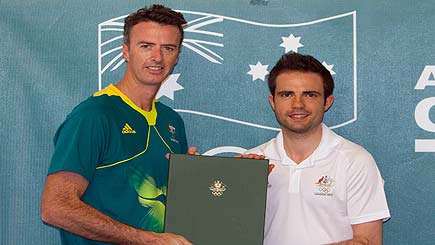
The next day I played Joao Monteiro from Portugal. He was another step up against at 39 in the World. I went out and got thumped in the first set, losing 11-2. I was going for my shots (I knew I had to if I wanted to win the match) but always seemed just off the pace, missing by 50cm – a metre. I turned the match around by continuing to believe in my game and shots, winning the next three sets before losing the 5th set. I led 3 games to 2 and 6-3 in the 6th set but he came back at me again. He had a chance to take the match to a 7th set (which he would have been strong favourite to win) when he led 10-9 but I took the set and match 12-10. If I thought it had been good to beat Pattantyus, it was nothing compared to how good it felt to beat Monteiro. I remember jumping and jumping in the air after his last shot went long and the rush of adrenaline shooting through my body. All that I had been through over 18 months became totally worth it in those moments.
My next match was against Vladimir Samsonov, a former world number 1 and the 9th seed in London. I almost pulled out one of the upsets of the Olympics when I led 4-1 in the deciding 7th game. He showed his class from there onwards to save himself from defeat. Later that day he came close to beating World number 1 and eventual gold medallist Zhang Yike of China in the next round. As the adrenaline of the match subsided, I felt waves of sadness as I thought about how close I’d come to beating an icon of the sport at the Olympics. It would have been pretty cool to play Zhang Yike in the round of 16 at the Olympics! I attempted to maintain my form for the team event but couldn’t. We lost 3-0 to Singapore and I lost my match 3-0 against the world number 25.
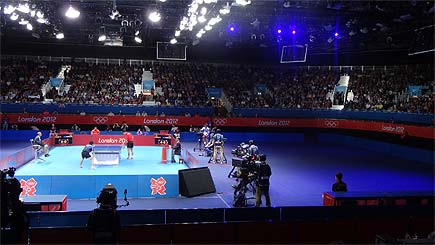
I had planned to leave the Olympic village and London soon after my competition had ended to go on holiday with my fiancée Danni. It is easy to get cabin fever in the village and I was expecting to hit a big low after my 18 months of preparation had run its course. Very few players get to leave competition on a victory so almost everyone else is left to consider what may have been. I needed to get my head clear as soon as possible and occupy myself with anything but table tennis. It has worked!
I was very, very pleased when the August world rankings came out and I had moved up to number 91 in the World. I had almost given up any hope of finally cracking the top 100 (my best was 108 in June 2010). Although I would say it didn’t matter when people asked me about the top 100, I was secretly unhappy about not having made it as I think it is a wonderful achievement personally. I fear it will be difficult to maintain a top 100 ranking once I return to full-time work in a couple of weeks time but I will do my best.
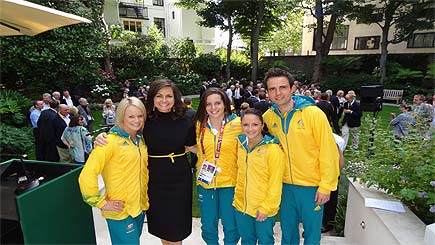
The 2016 Olympics are going to be held in Rio. It is a long way off and a lot could happen between now and then. I would like to think I will still be in the mix for a spot on the Australian team for Rio and will still be able to balance work with training 4 or 5 times per week. We will see.
